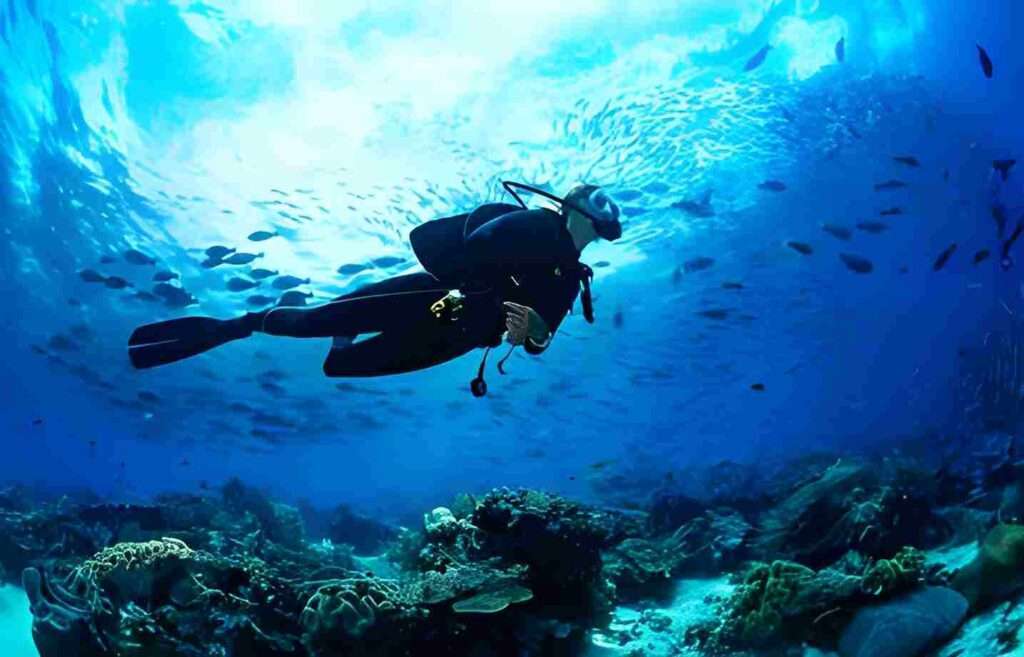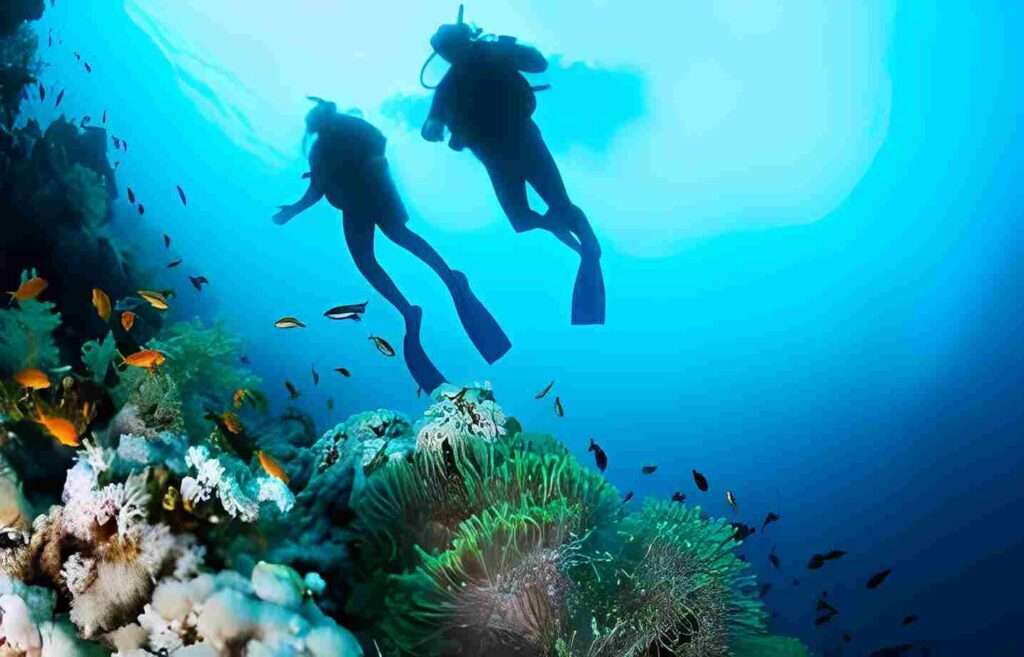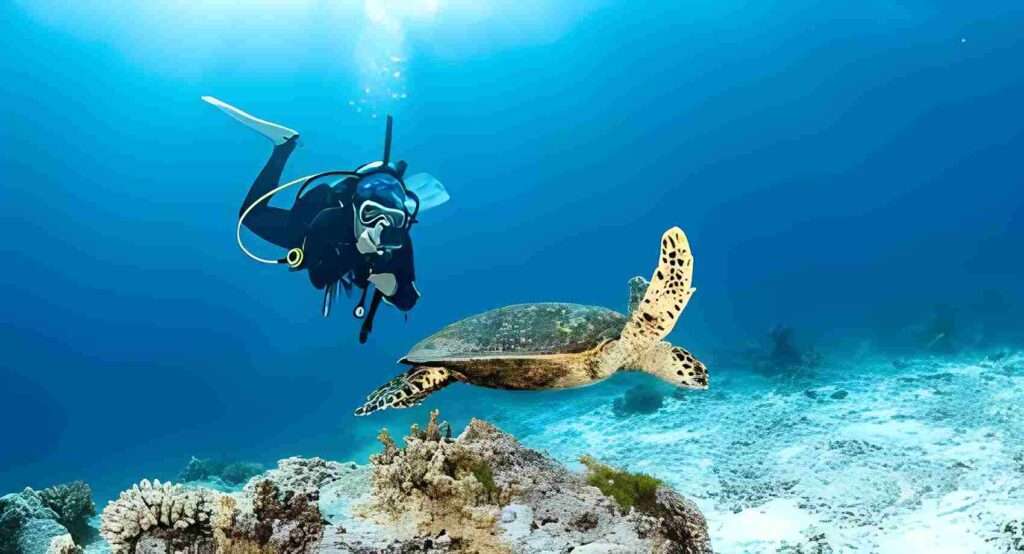Scuba diving is a popular activity that allows individuals to explore the depths of the ocean. However, for beginners, mastering the art of scuba diving can be an intimidating task. From learning the necessary skills to obtaining the proper certification, several steps must be taken to become a professional scuba diver.
One of the first steps in becoming a professional scuba diver is to learn the essential skills required for scuba diving. These skills include never holding your breath, equalizing your ears, mastering buoyancy control, clearing your mask and regulator, releasing air from your BCD on your ascent, and performing a safety stop at 5-6 meters. With these skills mastered, beginners can progress to more advanced techniques and become more confident in their abilities.
Once beginners have mastered the essential skills required for scuba diving, they must obtain the proper certification. Certification courses are available for individuals of all skill levels, from beginner to professional. These courses provide individuals with the necessary knowledge and training to safely and confidently explore the ocean depths. By obtaining the proper certification, individuals can become professional scuba divers and embark on a career in the diving industry.
Understanding Scuba Diving Basics
Scuba diving is a thrilling and exciting activity that allows individuals to explore the underwater world. Before venturing into this activity, it is important to understand the basics of scuba diving. In this section, we will discuss the history of scuba diving, scuba equipment overview, and diving physics and physiology.
History of Scuba Diving
Scuba diving has been around for centuries, but it wasn’t until the mid-20th century that it became a popular recreational activity. Jacques Cousteau and Emile Gagnan invented the first self-contained underwater breathing apparatus (SCUBA) in 1943, which allowed divers to stay underwater for extended periods. Since then, scuba diving has evolved into a popular sport and a lucrative industry.
Scuba Equipment Overview
Scuba diving requires a variety of equipment to ensure the safety and comfort of the diver. Some of the essential pieces of equipment include:
- Dive mask: Allows the diver to see underwater.
- Regulator: Converts the high-pressure air in the scuba tank to breathable air.
- The buoyancy control device (BCD): Helps the diver maintain neutral buoyancy underwater.
- Wet suit or dry suit: Provides thermal insulation and protects the diver from the elements.
- Fins: Helps the diver move through the water efficiently.
Diving Physics and Physiology
Scuba diving involves understanding the physics and physiology of diving. The pressure and density of water affect the diver’s body and equipment. As the diver descends, the pressure increases, and the air in the scuba tank compresses. This can cause discomfort or even injury if the diver does not equalize the pressure in their ears and sinuses. Additionally, the colder temperatures and reduced visibility can affect the diver’s body and mental state.
In terms of physiology, diving can affect the body in various ways. The increased pressure can cause nitrogen to dissolve in the body tissues, which can lead to decompression sickness if the diver ascends too quickly. Divers must also monitor their air supply and breathing rate to avoid hypoxia or carbon dioxide toxicity.
Overall, understanding the basics of scuba diving is essential for a safe and enjoyable diving experience. By knowing the history of scuba diving, the necessary equipment, and the physics and physiology of diving, individuals can become confident and knowledgeable divers.
Getting Certified
Becoming a certified scuba diver is the first step towards exploring the underwater world. In this section, we’ll cover the basics of getting certified, including choosing a certification agency, the certification process, and safety and buddy system basics.
Choosing a Certification Agency
There are many scuba diving certification agencies to choose from, including CMAS, SSI, NAUI, and PADI. It’s important to choose an agency that is recognized worldwide and has a good reputation. PADI is the world’s largest diving training organization and is recognized in over 183 countries.
The Certification Process
To become a certified scuba diver, one must pass a series of training courses that include both classroom and practical sessions. The courses cover topics such as dive theory, safety, decompression theory, and more. The training is divided into different levels, starting from beginner to professional. It’s important to choose a level that suits your experience and skill level.
Safety and Buddy System Basics
Scuba diving is a safe activity when done correctly, but it’s important to follow safety guidelines and use the buddy system. The buddy system ensures that there is always someone to help in case of an emergency. It’s also important to check your equipment before every dive and to follow all safety procedures.
In conclusion, becoming a certified scuba diver is a process that requires dedication and commitment. By choosing a reputable certification agency, following the certification process, and practicing safety guidelines, anyone can master the art of scuba diving.
Mastering Diving Techniques
Breathing and Buoyancy Control
Breathing and buoyancy control are essential skills to master in scuba diving. To improve your breathing technique, take slow, deep breaths, inhaling and exhaling fully. It is also important to use your diaphragm to breathe through your stomach, rather than your chest. This helps you stay calm and relaxed, conserving air and minimizing the risk of decompression sickness.
Buoyancy control is equally important. It allows you to maintain your position underwater and conserve energy. To achieve proper buoyancy, you need to control your breathing, adjust your weight system, and use your fins to maintain a stable position.
Underwater Navigation
Underwater navigation is a crucial skill for any scuba diver. It involves using a compass, natural navigation, and visual reference points to navigate underwater. To improve your navigation skills, practice using a compass and familiarize yourself with the underwater environment. You can also use natural navigation techniques, such as following the reef or using the sun’s position to determine direction.
Handling Diving Emergencies
Handling diving emergencies requires quick thinking and decisive action. It is important to be prepared for emergencies by carrying a dive knife, signaling device, and extra air supply. If an emergency occurs, stay calm and follow the appropriate emergency procedures. This may involve providing assistance to another diver, ascending to the surface, or seeking medical attention.
Overall, mastering diving techniques takes time and practice. By improving your breathing and buoyancy control, underwater navigation, and emergency handling skills, you can become a proficient and confident scuba diver.
Exploring Marine Life
Marine Biology for Divers
As a scuba diver, it is essential to have a basic understanding of marine biology to fully appreciate the underwater world. Understanding marine life and their behavior can help divers identify different species and better appreciate their habitat. It also helps divers to understand how different marine organisms interact with each other and their environment.
Some of the most common marine creatures that divers encounter include sea turtles, sharks, rays, octopuses, and colorful fish species like clownfish, parrotfish, and angelfish. Divers should learn about the characteristics and behaviors of these animals to avoid disturbing them or causing harm unintentionally.
Responsible Interactions with Marine Life
Divers should always be mindful of their impact on the environment and take steps to minimize their impact on marine life. This includes avoiding touching or disturbing marine creatures, not feeding them, and not removing any marine life or artifacts from the ocean.
Some diving organizations offer courses on responsible diving practices, which teach divers how to interact with marine life in a way that is safe and respectful. For example, divers can learn how to approach marine life without causing stress or harm, how to identify signs of distress in marine animals, and how to avoid damaging coral reefs.
In summary, exploring marine life is a fascinating and rewarding aspect of scuba diving. However, divers need to have a basic understanding of marine biology and practice responsible diving practices to protect the environment and the marine creatures that call it home.
Dive Planning and Logistics

Planning and logistics are essential aspects of scuba diving, especially for beginners. A well-planned dive can make the difference between a safe and enjoyable experience and a dangerous and stressful one. Here are some important factors to consider when planning a dive.
Choosing Dive Sites
Choosing the right dive site is crucial to ensure a safe and enjoyable experience. Consider the skill level of the divers, the type of diving, and the conditions of the site. Beginners should start with shallow and calm dive sites with easy access to the surface. Experienced divers can explore more challenging sites, such as wrecks or deep dives.
Understanding Dive Conditions
Before diving, it’s important to understand the conditions of the site. The water temperature, visibility, and currents can affect the dive experience. Check the weather forecast and the local conditions to ensure the dive is safe and enjoyable. It’s also important to check the tides and currents, which can affect the dive plan and the safety of the divers.
Equipment Preparation and Maintenance
Proper equipment preparation and maintenance are essential for a safe and enjoyable dive. Before the dive, check the gear for any damage or malfunctions. Ensure that the tanks are filled and the regulators are working properly. It’s also important to check the dive computer and the compass, which are essential tools for the dive plan. After the dive, rinse and dry the gear to prevent corrosion and damage.
By considering these factors, divers can plan a safe and enjoyable dive. With proper planning and logistics, divers can master the art of scuba diving, from beginner to pro.
Advanced Diving Skills
Scuba diving is an exciting and adventurous activity that requires a certain level of skill and knowledge. Once you have obtained your Open Water Diver certification, you can take your diving skills to the next level by completing the Advanced Open Water Diver course. This course will equip you with advanced diving skills, allowing you to explore the underwater world with confidence.
Deep Diving Techniques
Deep diving is one of the most exciting and challenging types of diving. It involves diving to depths of up to 100 feet (30 meters) and requires specialized training and equipment. The Advanced Open Water Diver course will teach you the skills and techniques needed to safely explore deeper waters. This includes learning how to manage your air supply, how to handle decompression stops, and how to navigate using a dive computer.
Night Diving
Night diving is a unique and thrilling experience that allows you to explore the underwater world in a whole new way. The Advanced Open Water Diver course will teach you the skills and techniques needed to safely dive at night. This includes learning how to use specialized dive lights, how to navigate in the dark, and how to communicate with your dive buddy.
Wreck Diving
Wreck diving is a fascinating type of diving that allows you to explore sunken ships, planes, and other underwater structures. The Advanced Open Water Diver course will teach you the skills and techniques needed to safely explore wrecks. This includes learning how to navigate through tight spaces, how to manage your buoyancy, and how to safely enter and exit wrecks.
Overall, the Advanced Open Water Diver course is an excellent way to improve your diving skills and gain the confidence needed to explore the underwater world. By learning advanced diving skills such as deep diving, night diving, and wreck diving, you can take your diving to the next level and experience all that the underwater world has to offer.
Specialized Diving Activities

Photography and Videography Underwater
Scuba diving is an excellent opportunity to capture the underwater world through photography and videography. This specialized diving activity requires knowledge of underwater cameras, lighting, and composition. It is important to have a good understanding of buoyancy control to avoid disturbing marine life and damaging the environment. A variety of camera housings are available for different types of cameras, and it is essential to choose the right one to ensure the camera’s safety underwater.
To capture the best shots, divers should learn how to position themselves and their equipment in the water. A steady hand and patience are also crucial for capturing the perfect shot. Additionally, divers should be aware of their surroundings and avoid touching or disturbing marine life.
Cave Diving Essentials
Cave diving is a specialized form of scuba diving that requires additional training and equipment. It involves exploring underwater caves, which can be dangerous and challenging. Proper cave diving training is essential for this activity, and divers should have a good understanding of buoyancy control, navigation, and safety procedures.
Cave diving equipment includes specialized lights, reels, and guidelines. Divers should also carry backup equipment and have a good understanding of the cave’s layout and potential hazards. It is essential to follow the guidelines and safety procedures to avoid accidents and ensure a safe and enjoyable dive.
Ice Diving Fundamentals
Ice diving is a specialized form of scuba diving that requires additional training and equipment. It involves exploring the underwater world beneath the ice. Ice diving requires specialized equipment, including drysuits, undergarments, and thermal protection. Divers should also have a good understanding of cold water diving and the potential hazards of ice diving.
Ice diving requires a good understanding of buoyancy control and safety procedures. Divers should also be aware of the potential hazards, including entanglement and hypothermia. It is essential to follow the guidelines and safety procedures to ensure a safe and enjoyable dive.
Traveling as a Scuba Diver
Scuba diving is a popular activity that can be enjoyed all over the world. Whether you’re a beginner or a pro, traveling to different destinations to experience new dive sites is an exciting part of being a scuba diver. In this section, we’ll discuss some tips for selecting scuba travel destinations and offer some travel tips for divers.
Selecting Scuba Travel Destinations
When selecting a scuba travel destination, there are a few things to consider. First, you’ll want to choose a location that offers dive sites suitable for your skill level. If you’re a beginner, you’ll want to choose a destination that offers shallow dive sites with calm waters. If you’re a more experienced diver, you may be interested in exploring deeper dive sites with stronger currents.
Another factor to consider is the time of year. Some destinations may have better diving conditions during certain seasons. For example, certain destinations may have better visibility during the summer months, while others may have better conditions during the winter.
Finally, you’ll want to consider the overall cost of the trip. Scuba diving can be an expensive hobby, and travel costs can add up quickly. Be sure to research the cost of flights, accommodations, and dive packages before booking your trip.
Travel Tips for Divers
When traveling as a scuba diver, there are a few things to keep in mind. First, it’s important to pack your scuba gear properly to avoid damage during transportation. Be sure to pack your gear in a sturdy bag and use padding to protect delicate equipment.
It’s also a good idea to research the local dive shops and dive operators before arriving at your destination. This will give you an idea of what to expect and ensure that you’re working with a reputable dive operator.
Finally, be sure to stay hydrated and well-rested during your trip. Scuba diving can be physically demanding, and proper rest and hydration are essential for a safe and enjoyable experience.
By following these tips, you can ensure a safe and enjoyable scuba diving trip to your chosen destination.
Joining the Diving Community
Scuba diving is an exciting and rewarding activity that can be enjoyed by people of all ages and backgrounds. Whether you are a beginner or an experienced diver, joining a diving community can help you meet other divers, learn new skills, and explore new dive sites. Here are some ways to get involved in the diving community:
Diving Clubs and Organizations
Joining a diving club or organization can be a great way to meet other divers and participate in group dives and events. Some popular diving organizations include the Professional Association of Diving Instructors (PADI), the National Association of Underwater Instructors (NAUI), and the Scuba Diving International (SDI). These organizations offer a variety of courses and certifications, as well as opportunities for continuing education and networking.
Continuing Education and Events
Continuing education is an important part of scuba diving, as it allows divers to improve their skills and knowledge and explore new areas of interest. Many diving organizations offer advanced courses and certifications, such as underwater photography, wreck diving, and cave diving. In addition, there are many diving events and competitions held around the world, such as the International Underwater Film Festival and the World Freediving Championships.
Overall, joining the diving community can be a great way to meet other divers, learn new skills, and explore new dive sites. Whether you are a beginner or an experienced diver, there are many resources available to help you get started and continue your diving journey.
Conservation and Scuba Diving

Understanding Ocean Conservation
Scuba diving is an activity that allows individuals to explore the underwater world and witness the beauty of marine life. However, it is important to understand that the ocean is facing numerous environmental challenges such as climate change, pollution, and overfishing. These issues are not only detrimental to marine life but also to humans who rely on the ocean for food, recreation, and livelihoods.
Ocean conservation is the practice of protecting the ocean and its resources from these environmental threats. It aims to maintain the health and productivity of the ocean while also ensuring the sustainability of its resources for future generations. As a scuba diver, it is important to understand the importance of ocean conservation and how you can contribute to its efforts.
Diver’s Role in Marine Conservation
Scuba divers have a unique opportunity to witness firsthand the beauty and fragility of the ocean. They can also play a vital role in ocean conservation efforts by following sustainable diving practices and participating in conservation initiatives. Here are some ways scuba divers can contribute to ocean conservation:
- Reduce your impact: Scuba divers can reduce their impact on the ocean by following sustainable diving practices such as not touching or disturbing marine life, avoiding contact with fragile coral reefs, and not littering or leaving trash in the ocean.
- Participate in conservation initiatives: Scuba divers can also participate in conservation initiatives such as reef cleanups, marine life surveys, and coral restoration projects. These initiatives not only help to protect the ocean but also provide divers with a sense of purpose and fulfillment.
- Spread awareness: Scuba divers can also spread awareness about ocean conservation by educating others about the importance of protecting the ocean and its resources. This can be done through social media, word of mouth, or by participating in educational programs and events.
By following sustainable diving practices and participating in conservation initiatives, scuba divers can contribute to the efforts of ocean conservation and help protect the underwater world for future generations.
Building a Diving Career
Becoming a professional scuba diver requires dedication, commitment, and a passion for the sport. With the right training and experience, one can turn their love for diving into a fulfilling career. Here are some pathways to consider when building a diving career.
Professional Diving Pathways
There are several professional diving pathways to choose from, each with its own set of requirements and opportunities. These pathways include:
- Dive Master: This certification level is the first step towards a professional diving career. As a Dive Master, one can assist instructors during their classes and become a group guide.
- Instructor: To become an instructor, one must have a Divemaster certification and at least 60 logged dives to start the Instructor Development Course (IDC). After completing the IDC, one can teach scuba diving courses and certify new divers.
- Technical Diving: Technical diving involves diving beyond recreational limits and requires specialized training. Technical divers can explore deeper wrecks, caves, and other challenging environments.
Instructor Development
To become a scuba diving instructor, one must complete an Instructor Development Course (IDC) and pass a final exam. The IDC covers topics such as risk management, teaching techniques, and dive theory.
In addition to the IDC, instructors must also have current CPR and First Aid training and at least 100 logged dives to receive instructor-level certification.
Becoming a scuba diving instructor can be a rewarding career choice for those who enjoy teaching and sharing their passion for diving with others.
Overall, building a diving career requires dedication, hard work, and a love for the sport. With the right training and experience, one can turn their passion for diving into a fulfilling profession.
Frequently Asked Questions
What are the prerequisites for enrolling in a Master Scuba Diver program?
Before enrolling in a Master Scuba Diver program, an individual must have attained a Rescue Diver certification, logged at least 50 dives, and completed five specialty courses. These requirements demonstrate a level of experience and knowledge necessary to undertake the more challenging aspects of the Master Scuba Diver program.
How many logged dives are required to begin training for a Divemaster certification?
To begin training for a Divemaster certification, an individual must have logged at least 40 dives. This prerequisite ensures that the individual has a solid foundation of diving experience before undertaking the rigorous training required for a Divemaster certification.
What specific diving specialties are necessary to qualify for Master Scuba Diver status?
To qualify for Master Scuba Diver status, an individual must complete five specialty courses. The courses can be selected from a range of options, including underwater photography, wreck diving, and deep diving. The selection of courses will depend on the individual’s interests and goals.
What is the typical duration of training from a beginner diver to achieving Master Scuba Diver level?
The duration of training from a beginner diver to achieving Master Scuba Diver level varies depending on the individual’s pace of learning, diving experience, and availability. However, the training typically takes around 18-24 months. This duration allows the individual to gain the necessary skills, experience, and knowledge required to achieve the Master Scuba Diver level.
What is considered the most crucial scuba skill that a diver should master?
The most crucial scuba skill that a diver should master is buoyancy control. Buoyancy control is essential for maintaining stability and conserving energy underwater. It also allows the diver to dive safely and comfortably, reduce the risk of damaging the marine environment, and improve their overall diving experience.
Is the path to becoming a Master Scuba Diver considered challenging, and what are the common obstacles?
The path to becoming a Master Scuba Diver is considered challenging due to the rigorous training, diving experience, and knowledge required. The common obstacles that individuals may face include time constraints, financial constraints, and the physical demands of diving. However, with dedication, commitment, and a passion for diving, individuals can overcome these obstacles and achieve the Master Scuba Diver level.
